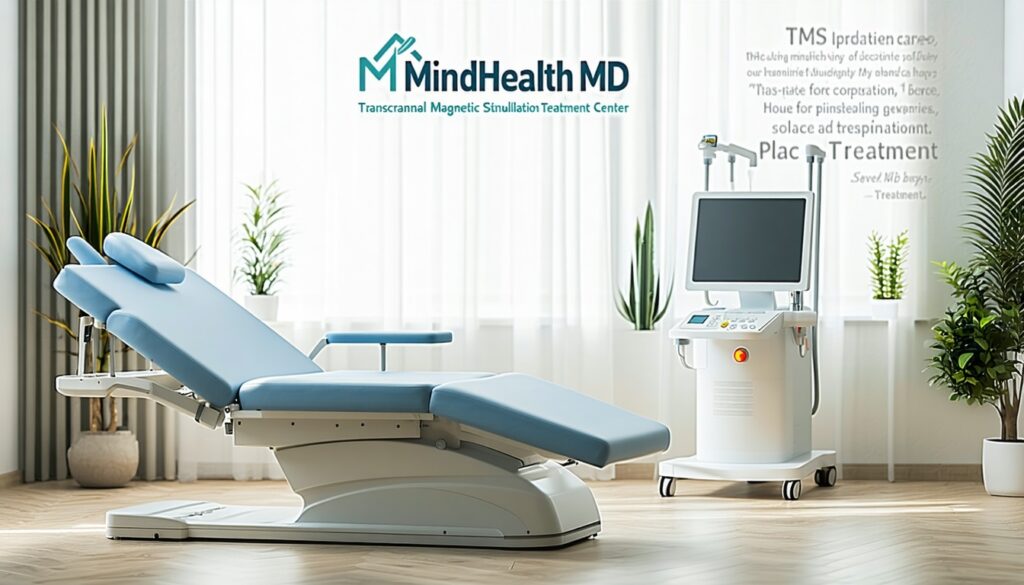Understanding TMS Therapy
What is TMS Therapy?
Transcranial Magnetic Stimulation (TMS) is a noninvasive treatment technique that uses a magnetic field to influence brain activity. Since its development in 1985, TMS has been proven effective in treating various conditions, particularly major depression, obsessive-compulsive disorder, and other brain-related disorders. The U.S. Food and Drug Administration (FDA) has approved TMS for use in treating major depression when other treatments have not achieved desirable results. Additionally, it is utilized for conditions such as OCD, migraines, and as a smoking cessation aid when conventional treatments prove ineffective [2].
One of the key benefits of TMS is its noninvasive nature, making it a favorable option for patients who prefer to avoid surgical interventions like electroconvulsive therapy (ECT). As a leading TMS treatment center, MindHealth MD focuses on providing comprehensive and compassionate care for those seeking this innovative therapy.
Safety and Efficacy of TMS
TMS is generally considered safe, and most patients either don’t experience any side effects or only have mild ones. These may include temporary scalp discomfort or headaches, which are manageable with over-the-counter painkillers [3]. The safety profile of TMS makes it an attractive alternative for individuals looking for a drug-free depression treatment.
Studies consistently show that TMS is an effective method for treating depression, with response and remission rates comparable to those of psychotherapy and traditional medications, particularly in cases of treatment-resistant depression (TRD). TMS offers hope for those who have struggled with medication side effects or have not found relief from traditional therapeutic methods.
If you are considering TMS therapy, it’s essential to consult with a qualified TMS therapy provider who can help assess your needs and determine if this innovative treatment is right for you.
Conditions Treated with TMS
TMS therapy has emerged as a powerful method for treating various mental health conditions. By understanding the approved uses and exploring non-depression treatments, you can make an informed decision about whether TMS services at MindHealth MD are right for you or a loved one.
Approved Uses of TMS
Transcranial Magnetic Stimulation (TMS) has received approval from the U.S. Food and Drug Administration (FDA) primarily for treating major depressive disorder. This method is particularly effective when other depression treatments have not yielded satisfactory results. Below is a table summarizing the main conditions that TMS can treat:
| Condition | FDA Approval Status |
|---|---|
| Major Depressive Disorder | Approved |
| Obsessive-Compulsive Disorder (OCD) | Approved |
| Migraines | Approved |
| Smoking Cessation | Approved |
If you’re dealing with major depressive disorder or similar conditions, TMS therapy might provide a much-needed alternative to traditional methods.
Exploring Non-Depression Treatments
In addition to its use for major depression, TMS also shows promise in treating other conditions. Research continues on its effectiveness for various non-depression treatments. This includes:
- Obsessive-Compulsive Disorder (OCD): TMS has a specific approval for treating OCD, with deep TMS showing significant effectiveness.
- Migraines: For individuals suffering from migraines, TMS therapy can offer relief when other treatments have failed.
- Smoking Cessation: TMS assists patients trying to quit smoking, particularly when conventional strategies have not been successful.
Ongoing studies are investigating the potential of TMS for managing conditions like epilepsy and other mood disorders. Engaging with a TMS therapy provider can help clarify these options.
TMS therapy stands out as a non-invasive depression treatment and a drug-free depression treatment that could change the way conditions like OCD and migraines are managed. If you or someone you care about struggles with these issues, learning more about TMS could be the first step to a brighter future.
Benefits of TMS Treatment
TMS Therapy, offered at a leading TMS treatment center, has shown remarkable benefits for individuals seeking relief from depression and other mental health conditions. Understanding the response and remission rates, as well as insights from comparative studies, will give you a clearer picture of why TMS might be the right choice for you or a loved one.
Response and Remission Rates
The response and remission rates provide crucial insights into the effectiveness of TMS therapy. Studies indicate that the standard form of TMS (rTMS) boasts a response rate of approximately 66% and a remission rate of around 55%. In contrast, newer protocols like the SAINT-iTBS demonstrate even higher efficacy, with response rates reaching 85.7% and remission rates at 78.6%.
| TMS Protocol | Response Rate (%) | Remission Rate (%) |
|---|---|---|
| Standard rTMS | 66 | 55 |
| SAINT-iTBS | 85.7 | 78.6 |
These figures underscore the potential of TMS in effectively treating depression, particularly for those who have not found relief with traditional methods.
Comparative Effectiveness Studies
TMS therapy shows comparable effectiveness to psychotherapy and medication, particularly for treatment-resistant depression (TRD). Research illustrates that when TMS is employed as monotherapy, it achieves response and remission rates of up to 50% [4]. Furthermore, combining TMS with psychotherapy can yield significant clinical benefits. In such studies, a combination approach resulted in a reported remission rate of 55%, demonstrating enhanced outcomes compared to TMS used alone.
The following table summarizes these findings.
| Treatment Method | Response Rate (%) | Remission Rate (%) |
|---|---|---|
| TMS as Monotherapy | Up to 50 | Not specified |
| TMS with Psychotherapy | Not specified | 55 |
TMS serves as a promising alternative to traditional medications, being relatively safe with minimal side effects, primarily mild focal headaches. It also avoids the risks of dependence or withdrawal that some medications can entail [4].
By leveraging the advantages of TMS therapy, you can potentially transform your mental health journey. For more information, consider exploring TMS options such as TMS for treatment-resistant depression or tms for PTSD.
Side Effects and Considerations
When considering TMS therapy at a leading TMS treatment center, it’s important to understand both the common side effects and the safety profile associated with this innovative treatment. Knowing these aspects can help you make informed decisions regarding your therapy.
Common Side Effects of TMS
TMS therapy is generally well-tolerated, but like any medical treatment, it may have some side effects. The most common side effects include:
| Side Effect | Description |
|---|---|
| Headaches | Mild discomfort that typically resolves quickly. |
| Localized Pain | Discomfort at the site of stimulation. |
| Scalp Discomfort | Mild irritation or soreness on the scalp. |
| Increased Sensitivity to Sound | Temporary heightened response to sound. |
| Psychological Changes | Minor mood fluctuations during treatment. |
These side effects are usually mild and temporary, often diminishing after a few sessions. Studies indicate that with more treatments, the frequency and intensity of these side effects tend to lessen.
Seizure Risk and Safety Profile
One of the more serious, yet extremely rare, side effects of TMS is the possibility of seizures. Current data suggests that seizures occur at a rate of less than 3 per 100,000 TMS sessions, equating to a risk of approximately 0.01% or less than 1 in 10,000 sessions [6]. It’s essential to note that patients with a previous history of seizures or certain neuropsychiatric conditions may be at a higher risk.
Despite the potential for serious side effects, TMS remains a non-invasive brain stimulation option that does not typically require anesthesia and does not induce memory loss. These factors contribute to its profile as a safe and effective treatment alternative. If you’re concerned about TMS therapy, consider scheduling a first-time TMS consultation with a qualified TMS therapy provider to discuss your specific needs and health history.
For more information about side effects and results, refer to our article on TMS side effects and results.
Patient Selection and Eligibility
Understanding the patient selection and eligibility criteria for transcranial magnetic stimulation (TMS) therapy is essential for those considering this innovative treatment option. MindHealth MD ensures a thorough evaluation process to determine if TMS is the right fit for you or your loved one.
Criteria for TMS Therapy
To be considered for TMS therapy, several crucial criteria need to be met:
- Diagnosis: The primary requirement is a confirmed diagnosis of treatment-resistant depression. This typically means that you have tried and not responded to at least two different antidepressant medications or other standard treatments.
- Age: While there is no strict age limit, most adult patients are eligible.
- Medical and Psychiatric Evaluations: Comprehensive evaluations help identify any other underlying conditions that may affect treatment outcomes.
- Medication History: A thorough understanding of your previous treatment history aids in determining appropriateness for TMS.
- Symptom Severity: This assesses the current state of your symptoms to ensure that TMS would be beneficial.
- Patient Commitment: Your willingness to adhere to the treatment plan plays a vital role in the success of the therapy.
To learn more about qualifications for TMS therapy, refer to our article on who qualifies for TMS therapy.
Evaluation Process for TMS
The evaluation process for TMS therapy at MindHealth MD involves several steps to ensure that you receive the most suitable care. Here’s an overview of what to expect:
- Initial Consultation: This involves discussing your mental health history and current symptoms with a qualified professional.
- Diagnosis Review: Your medical records and diagnosis will be reviewed to confirm eligibility for TMS.
- Assessment of Medical History: A detailed look into your past treatments, medication responses, and any additional health considerations is essential.
- Psychiatric Evaluation: A mental health professional will conduct an assessment to understand your emotional well-being and readiness for TMS.
- Commitment Evaluation: It’s important to evaluate your commitment to follow through with the recommended treatment plan, which typically consists of multiple sessions.
This thorough process ensures that every patient at MindHealth MD receives individualized, effective care that is specific to their needs. For additional information on the TMS process, you can check our article on first time TMS consultation.
Advancements in TMS Technology
In the rapidly evolving field of TMS therapy, recent advancements have significantly improved treatment effectiveness and patient experience. At MindHealth MD, you can benefit from state-of-the-art TMS technology designed for optimal results.
Accelerated TMS Protocols
Accelerated TMS protocols have transformed the approach to treating conditions like treatment-resistant depression. This form of therapy includes techniques such as intermittent theta-burst stimulation (iTBS), allowing for shorter treatment sessions that effectively enhance patient outcomes. In fact, clinics utilizing accelerated TMS have reported impressive results, with approximately 85.7% of patients responding positively and around 78.6% achieving remission shortly after beginning treatment [8].
In comparison to traditional TMS treatments, which usually take longer and may have a delayed onset of effects, accelerated protocols have demonstrated the ability to quickly reduce depressive symptoms and suicidal ideations within just five days. The sustained remission rate after one month remains high, at about 60%. This rapid impact can make a significant difference for those struggling with severe symptoms.
| Treatment Type | Response Rate | Remission Rate | Time to Response |
|---|---|---|---|
| Standard TMS | Varied | Varied | Longer |
| Accelerated TMS (iTBS) | 85.7% | 78.6% | 5 Days |
Neuroimaging Techniques in TMS
Neuroimaging techniques, such as functional MRI (fMRI) and neuronavigation, play an essential role in the delivery of effective TMS therapy. These technologies allow clinicians to precisely target specific brain regions responsible for mood regulation, significantly enhancing the accuracy of coil placement during treatment. Research indicates that TMS clinics employing fMRI-guided neuronavigation see significantly improved response and remission rates in their patients compared to those using standard TMS or iTBS protocols.
Combining neuroimaging with accelerated TMS has also shown to enhance long-term outcomes for patients when integrated with other treatments, like cognitive behavioral therapy (CBT). TMS can deliver rapid relief from depressive symptoms, while CBT provides long-lasting benefits, creating a comprehensive approach that improves overall treatment effectiveness.
You deserve the most advanced options available, and at MindHealth MD, you can find the latest TMS technologies designed to help you or your loved one achieve lasting mental health improvements. For additional insights, consider exploring TMS for specific conditions, such as TMS for OCD or TMS for treatment-resistant depression.








